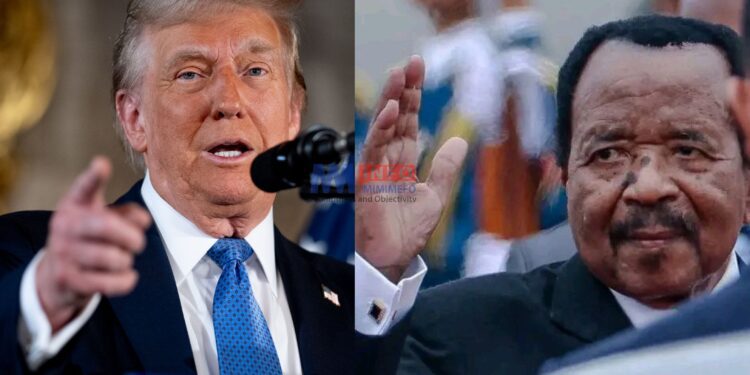The Trump administration is reportedly considering imposing travel restrictions on citizens from Cameroon, as part of a broader effort targeting up to 41 countries. According to an internal memo seen by Reuters, Cameroon has been placed in a category of nations given 60 days to improve their security and vetting procedures or face visa restrictions.
Cameroon on the “Yellow List”
Under the proposed plan, Cameroon falls into the third tier of affected countries—often referred to as the “Yellow List.” Nations in this category are not facing an immediate ban but are being urged to make adjustments to their screening and vetting processes. Failure to comply within the 60-day window could lead to partial visa suspensions for Cameroonian citizens seeking entry to the United States.
A Broader Crackdown on Immigration
The travel restrictions are part of a wider immigration policy by the Trump administration, which has intensified security vetting for foreign nationals. The January 20 executive order directed multiple U.S. government agencies to evaluate countries based on their ability to share security information with U.S. authorities.
The U.S. Secretary of State, Marco Rubio, has yet to approve the memo proposing these restrictions, and it could still undergo amendments. However, if implemented, it could significantly impact Cameroonians seeking entry to the U.S. for education, work, or family visits.
Full List
The memo lists a total of 41 countries divided into three separate groups.
Full visa suspension: Afghanistan, Cuba, Iran; Libya; North Korea; Somalia; Sudan; Syria; Venezuela; Yemen
Partial visa suspension (tourist, student and some other visas affected):
Eritrea; Haiti; Laos; Myanmar; South Sudan;
Countries recommended for a partial suspension if they do not address deficiencies:
Angola; Antigua and Barbuda; Belarus; Benin; Bhutan; Burkina Faso; Cabo Verde; Cambodia; Cameroon; Chad; Democratic Republic of the Congo; Dominica; Equatorial Guinea; Gambia; Liberia; Malawi; Mauritania; Pakistan; Republic of the Congo; Saint Kitts and Nevis; Saint Lucia; Sao Tome and Principe; Sierra Leone; East Timor; Turkmenistan; Vanuatu.
A Return to Trump’s Immigration Crackdown
The proposed policy is part of Trump’s broader push to tighten immigration controls in his second term. His January 20 executive order mandated intensified security vetting for foreign travelers, directing key cabinet officials to identify countries with “deficient” screening measures by March 21.
During an October 2023 campaign speech, Trump vowed to expand travel restrictions to individuals from conflict zones, including Gaza, Libya, Somalia, Syria, and Yemen, arguing that such measures were necessary to protect national security.
Political and Diplomatic Reactions
The move has already drawn comparisons to Trump’s first-term travel ban, which sparked widespread protests and legal challenges. Critics argue that the policy disproportionately targets developing nations and could strain diplomatic ties, particularly with African and Caribbean nations.
On his first day in office in 2021, former President Joe Biden revoked Trump’s previous travel bans, calling them “a stain on our national conscience” and inconsistent with America’s history of welcoming people of all faiths and backgrounds.
Meanwhile, security analysts and State Department officials are reportedly reviewing the draft list, assessing whether the identified countries truly pose security risks or if political considerations are at play.
With the March 21 deadline approaching, the final list of restricted countries is still subject to change. However, if enacted, this new travel ban could mark a significant shift in U.S. immigration policy, with far-reaching consequences for international relations and global mobility.
Uncertain Future for Cameroonian Travelers
With the 60-day review period underway, Cameroon’s diplomatic efforts will be crucial in determining whether its citizens will continue to have unrestricted access to U.S. visas. Cameroonians with upcoming travel plans to the United States should monitor the situation closely and stay informed about any official announcements.
The Trump administration’s previous travel bans have faced legal challenges, particularly those targeting predominantly Muslim countries. It is unclear at this point whether this new wave of restrictions will encounter similar pushback from lawmakers and advocacy groups.
Evelyn Ndi contributed to this report



